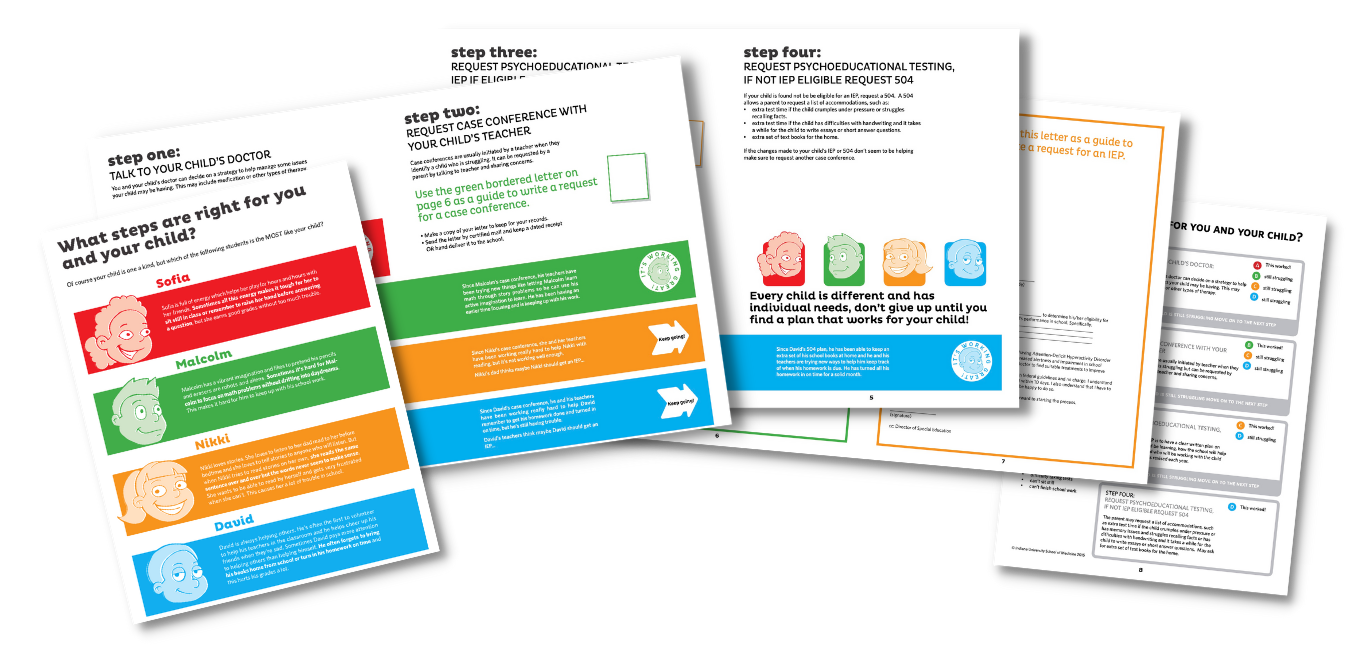School-based Support for Children who are Struggling: Tips for Parents to Navigate, Advocate and Collaborate
May 06, 2021Families need to feel they can advocate for their children, especially when struggling in school. Children with ADHD, anxiety or depression can have challenges with relationships and functioning in school. Knowing how to request for help or extra support can be overwhelming. There are terms or abbreviations that need to be explained in clear language. Families also need to know the 4 step process to getting an individual education plan (IEP) or 504 should it be needed.
RELATED: The Difference between IEPs and 504 plans (Understood.org)
Yes, pediatricians can help
Parents increasingly talk to their child’s pediatrician about behavior or learning challenges. However, many pediatricians often do not feel comfortable coaching families about educational advocacy.
RELATED: Educating children with disabilities: How pediatricians can help (Contemporary Pediatrics, September 2002)
When Families are Engaged, Everyone Wins
Helping families engage with the school and being involved in their child's education increases the likelihood of the child's educational success at any age. Some documented positive outcomes, regardless of the family background, include:
- Higher grades and test scores
- High quality work habits and task attendance
- Regular school attendance
- Better social skills and behavior
- Graduate and go on to post-secondary education
The first step is to make sure parents are viewed and feel like an equal partner at the table.. However, if parents have not had positive experiences with the school system either as a child or with their child, it makes it less likely that the parent will know where to start.
That is where pediatric providers can coach families on educational advocacy. In my work with ADHD group visits known as the TEACH program (Tailoring Education for ADHD and Children's Health), a two-hour session is dedicated to this topic. We focus on this because while medications may be the first thing parents think of after the diagnosis of ADHD, it is just one part of treatment.
In our first study of TEACH, we found pediatric providers crave tools to help explain the "alphabet soup" of educational advocacy. You know...IDEA, IEP, IFSP, 504 and OHI? That one.
Here’s what those abbreviations stand for: IDEA- Individuals with Disabilities Education Act; IEP-Individual Education Plan, IFSP-Individual Family Service Plan, OHI-Other Health Impaired (typical category that children with social-emotional challenges may qualify for an IEP)
RELATED: Is Your Child Struggling in School? Talk to Your Child's Pediatrician (NYT, Dr. Perri Klaus, Oct, 7, 2019)
So we engaged our patient advisory board and the Indiana University School of Medicine Patient Engagement team to help translate these complex topics into something that can easily be understood by pediatric providers and families alike.
We learned parents crave hearing stories about school experiences, even if it does not entirely relate to their own child. Stories have the power to help families understand concepts or scenarios in relatable ways.
'First-hand' experiences are seen as valuable to other parents.
Moreover, seeing different approaches helps families adapt to their own situation. As a result of this process, our design team came up with a "choose your own adventure" brochure. Every aspect of it has been carefully thought out--right to the "pauses" rather than hard stops at each part of the story.
Parents and providers felt the brochure simplified the conversation. It became a "road map" about the 4 step process to request an IEP or 504.

We used the brochure in the second study of TEACH. Now, I am sharing it with you. I would love to know what you think about it!
The first page introduces the four different characters: Sofia, Malcolm, Nikki and David. Each character has a different set of symptoms or behaviors. Each character is color coded. Parents can follow the storylines of each of the characters through the four steps. Parents will see how each character's story either pauses at one of the steps or continues on.
The Four Steps of Educational Advocacy
- Talk to your child's doctor
- Request a case conference with your child's teacher
- Request psychoeducational testing, Individual Education Plan (IEP) if eligible
- Request psychoeducational testing, if not IEP eligible, request 504
The brochure also includes two sample letters and on the back is a one page "cheat sheet" or cliff notes version of the process.

Download your copy here.*
If you'd like a Spanish version, please do email me directly at drnerissa@letstalkkidshealth.org
*Special thank you to our patient advisory board and Dr. Sarah Wiehe, Dustin Lynch, Courtney Moore (IU Patient Engagement Core) & to Helen Sanematsu.
Join my Facebook Community to talk more about this blog post and get more parenting support!
Stay connected with news and updates!
Join my mailing list to receive parenting tips and resources, including information about my weekly Facebook Live guests and workshops.
And don't worry, your information will not be shared.
We all hate SPAM. So I promise to never sell your information, for any reason.

